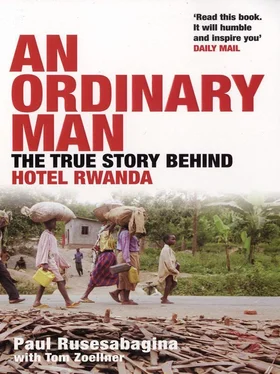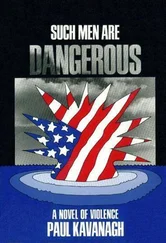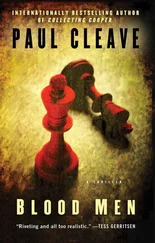There was a moment of surprise. The militiamen looked at one another, as if seeking the approval of the group for whatever actions would follow. The lives of hundreds hung in their uncertainty. They could easily have disobeyed him. Bizimungu was a powerful man with powerful allies, but there had been hundreds of mutinies against Army officers during the genocide-thousands of unapproved murders. And this was the Hotel Mille Collines: the citadel of Belgian arrogance, the luxurious island of privilege, the best redoubt of cockroaches anywhere in Rwanda. Didn’t the general see what kind of prize he was giving up?
I saw surly looks on the faces of several of those boys. Their lust had been rising and now it had been denied. They were primed to kill and this traitor general had put a stop to it. I could tell they now wanted to turn their fury onto him. But they didn’t. They lowered their machetes and began to file out.
General Augustin Bizimungu now sits in a jail cell. He will probably be there the rest of his life.
After the genocide he fled to Zaire, and then into faraway Angola. He was captured by local police there and brought before the International Criminal Tribunal that was organized to prosecute war crimes committed during the genocide of 1994. Bizimungu was charged with supervising the arming and training of the militias. As I write this, he has not yet been convicted. He is now held in Arusha, the same city in Tanzania that had hosted the ill-fated peace talks that led to the final outbreak of hostilities between the Rwandan Army and the rebels.
I have been criticized for my friendship with him during the genocide, but I have never apologized for it. “How could you have stayed close to such a vile man?” I am asked, and my answer is this: I do not excuse whatever he may have done to promote the genocide, but I never heard him agree with any of the bloodshed when he was in my presence. I had to stay close to him because he could help me save lives. I would have stayed close with anyone who could help me do that.
He is a man who cannot be judged in stark terms. Like almost all men, there are hard places and soft places inside and the final verdict can never be a simple one. There is a saying in Rwanda: “Every man has a secret corner of his mind that nobody will ever know.” And I do not think I know enough about Bizimungu’s secret corner to judge him. He may well have done terrible things in Rwanda before and during the genocide, but I know that he stepped in for me at crucial moments to save the lives of innocent people when it was of no conceivable benefit to him.
If I had ended that friendship, I do not think I would be here to write these words today. There are also at least 1, 268 people who survived the killing partly because of the instructions of Bizimungu. In my book that counts for something.
The aborted slaughter at the Mille Collines was what it took to convince all parties that the hotel must be cleared out without further dithering. The United Nations, the rebels, and the Rwandan Army conferred and decided to do it that very day. They assigned us those five Tunisian soldiers to guard the parking lot for the last night. It made me furious that they were given to us long after we needed them, but there was no point in making a scene. On that afternoon I busied myself with making sure everybody was out of their rooms safely. There was a line of jeeps and trucks outside, the third such time that an evacuation convoy had been assembled there, but I had a feeling this would truly be the last one.
I made a last check of the hotel where I had spent seventy-six of the longest days of my life. Though I had been convinced I would die inside of it I felt affection for the place. When I was a young man it was where I had found my true occupation. I had met some of the most generous people in my life within its walls. Sabena gave me a job when I needed one and taught me things I never would have learned otherwise. They showed me how to respect myself by respecting others. When the killing started the hotel had saved people. It had projected the image of an ultimately sane world that kept the murderers at bay. I am not a particularly sentimental man, but I felt the odd urge to stroke it like a pet dog.
I made sure that the hotel was empty of everybody who wanted to go. Some employees had asked to stay, and I let them. I couldn’t tell how many had been spies for the militia all along. By that point I was beyond caring. It was time to leave. When the UN convoy pulled away I was in the backseat of the last jeep. I hid under a plastic tarp for fear that the militias would recognize me and shoot at me as we drove by the roadblocks. The Mille Collines had been one of the very few places in Kigali where nobody was killed.
IN THE TIME BEFORE THE GENOCIDE it had been fashionable for the elite to buy country estates near a region named Kabuga just outside the capital. The area is attractive, with low hills and unusually large plantations full of grazing livestock. Almost everyone in Rwanda, no matter how long they have lived in a city, keeps close connections with the soil, and even a lifelong office worker probably has a few goats to call his own in a village somewhere outside the capital. The biggest gentlemen-farmer flocks, however, were at Kabuga. It was the best weekend address in the nation.
We were hustled there by the Rwandan Patriotic Front, which had turned it into a kind of refugee holding area. But it was no camp in the conventional sense. It was a looting zone.
Soldiers from the rebel army had stolen food from all the shops. Potatoes had been dug out of the fields. Goats had been captured and slaughtered. This made me furious. It was the same kind of impunity we had seen in 1959 during the Hutu Revolution, only this time it was yesterday’s victims who were helping themselves to the spoils. War is hell, and ugly things happen in its midst-I know this. But they always create permanent resentments that have a way of erupting later in history. The casual disrespect for other people and their property was what helped create the genocide we had just lived through. I was afraid I was watching the conception of another. It made me feel as though Rwandans had learned nothing at all.
It therefore does not make me proud to tell you this: I, too, was among those who had to forage for food. I can only say that it was a choice between that or going hungry. My family and I also slept in the house of an unknown family who had fled the advancing rebel army. I can only hope these strangers would forgive us today. I never knew who they were, but it made me terribly uncomfortable to be using their property.
There was a surprise in the camp. We spotted the children of my wife’s brother-the man who I had been dining with on the terrace of the Diplomates on the night Habyarimana’s plane had been shot down. Anaise was two and a half and Izere was barely a year old. They were being taken care of by our housemaid, who had managed to struggle into the camp. Both of the children were covered in dirt and appeared to be starving and barely alive. They had been living for months on ground-up chicken feed. Where were their parents? Tatiana was frantic to know. But the maid could only hold up her hands. The parents had both disappeared shortly after the genocide broke out. I remember shaking hands with my brother-in-law and his wife the night of the president’s assassination, a time that seemed to be as far away as my own childhood. He was bidding me good-bye and urged me to be safe before I went into my house that night. I now wondered if I had shaken his hand for the last time.
There were stories like that all over the camp: unexpected reunions and revelations of awful news from the past two and a half months. Nights were the hardest for us. Weeping filled the air. I found it hard to find even the mindless release of sleep. Wives came to understand that they would never see their missing husbands again. Parents had to force themselves to stop imagining how their irreplaceable children had died at the hands of strangers. And that emptiness in their lives would go on and on. It took a tremendous force of will to keep your own heart together in this unending grief.
Читать дальше











![Paul Finch - A Wanted Man [A PC Heckenburg Short Story]](/books/702381/paul-finch-a-wanted-man-a-pc-heckenburg-short-sto-thumb.webp)
